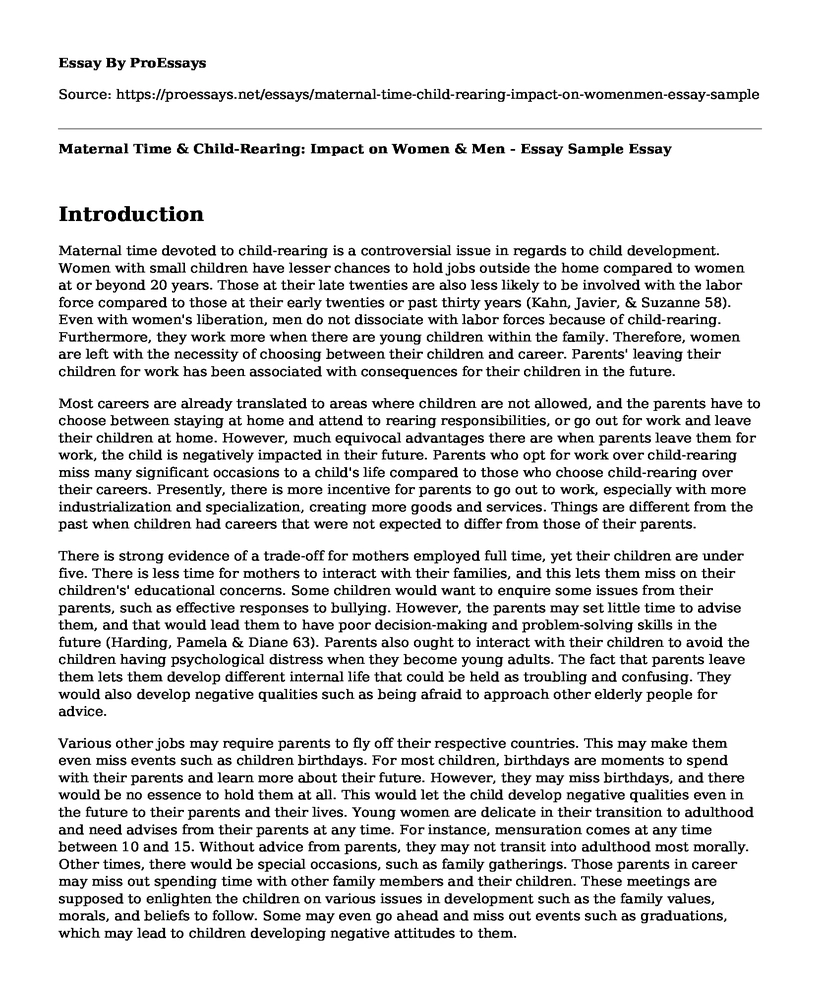Introduction
Maternal time devoted to child-rearing is a controversial issue in regards to child development. Women with small children have lesser chances to hold jobs outside the home compared to women at or beyond 20 years. Those at their late twenties are also less likely to be involved with the labor force compared to those at their early twenties or past thirty years (Kahn, Javier, & Suzanne 58). Even with women's liberation, men do not dissociate with labor forces because of child-rearing. Furthermore, they work more when there are young children within the family. Therefore, women are left with the necessity of choosing between their children and career. Parents' leaving their children for work has been associated with consequences for their children in the future.
Most careers are already translated to areas where children are not allowed, and the parents have to choose between staying at home and attend to rearing responsibilities, or go out for work and leave their children at home. However, much equivocal advantages there are when parents leave them for work, the child is negatively impacted in their future. Parents who opt for work over child-rearing miss many significant occasions to a child's life compared to those who choose child-rearing over their careers. Presently, there is more incentive for parents to go out to work, especially with more industrialization and specialization, creating more goods and services. Things are different from the past when children had careers that were not expected to differ from those of their parents.
There is strong evidence of a trade-off for mothers employed full time, yet their children are under five. There is less time for mothers to interact with their families, and this lets them miss on their children's' educational concerns. Some children would want to enquire some issues from their parents, such as effective responses to bullying. However, the parents may set little time to advise them, and that would lead them to have poor decision-making and problem-solving skills in the future (Harding, Pamela & Diane 63). Parents also ought to interact with their children to avoid the children having psychological distress when they become young adults. The fact that parents leave them lets them develop different internal life that could be held as troubling and confusing. They would also develop negative qualities such as being afraid to approach other elderly people for advice.
Various other jobs may require parents to fly off their respective countries. This may make them even miss events such as children birthdays. For most children, birthdays are moments to spend with their parents and learn more about their future. However, they may miss birthdays, and there would be no essence to hold them at all. This would let the child develop negative qualities even in the future to their parents and their lives. Young women are delicate in their transition to adulthood and need advises from their parents at any time. For instance, mensuration comes at any time between 10 and 15. Without advice from parents, they may not transit into adulthood most morally. Other times, there would be special occasions, such as family gatherings. Those parents in career may miss out spending time with other family members and their children. These meetings are supposed to enlighten the children on various issues in development such as the family values, morals, and beliefs to follow. Some may even go ahead and miss out events such as graduations, which may lead to children developing negative attitudes to them.
Parents' decision to leave their children for work has many negative implications for the child's future. Women are the most affected with the option between child-rearing and following their careers. With more globalization and industrialization, parents are being forced to work far from their homes, missing out on occasions such as birthdays, family gatherings, and graduation parties for their children. This may make the children develop negative attitudes towards their parents and not learn how to lead a good life in their future.
Works Cited
Kahn, Joan R., Javier GarciaManglano, and Suzanne M. Bianchi. "The motherhood penalty at midlife: Longterm effects of children on women's careers." Journal of Marriage and Family 76.1 (2014): 56-72.
Harding, Jessica F., Pamela A. Morris, and Diane Hughes. "The relationship between maternal education and children's academic outcomes: A theoretical framework." Journal of Marriage and Family 77.1 (2015): 60-76.
Cite this page
Maternal Time & Child-Rearing: Impact on Women & Men - Essay Sample. (2023, Feb 13). Retrieved from https://proessays.net/essays/maternal-time-child-rearing-impact-on-womenmen-essay-sample
If you are the original author of this essay and no longer wish to have it published on the ProEssays website, please click below to request its removal:
- General Motors Company Case Study Paper Example
- Essay Sample on Conflict Management: Action Plan
- Essay Example on Cultural Clash: Examining Black American Perception in the U.S.A.
- Essay Sample on Cultural Competence: Improving Health Care Experiences for Minority Patients
- Essay Example on Medicine Wheel: Symbol of Indigenous Identity & Dignity
- Essay Example on Corporate Social Responsibility: Enhancing Brand Value & Improving Society
- Bridging Gaps, Fostering Maturity, and Building Meaningful Relationships in Organizations - Paper Sample







